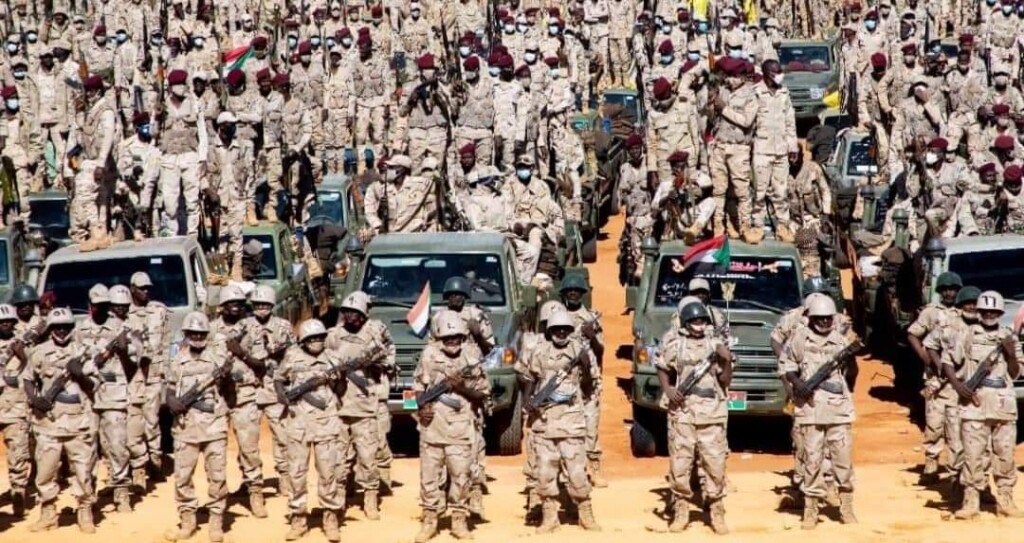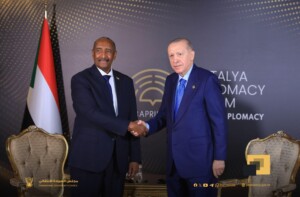Tensions rise between Sudan army and RSF militia

RSF forces near Merowe in northern Sudan, April 13, two days before the war with the Sudan Armed Forces erupted (File photo: RSF)
KHARTOUM –
The simmering tensions between Sudanese army and its paramilitary counterpart, the Rapid Support Forces (RSF) surfaced early this morning when the Sudan Armed Forces (SAF) issued a statement denouncing the increased deployment of RSF troops in Khartoum and northern Sudan.
“Preserving and maintaining the security and safety of the country is the constitutional and legal responsibility of the army, with the assistance of the various state institutions,” the spokesperson for the SAF General Command said in a statement issued at dawn today.
“The country is going through a historical and dangerous turn, and its dangers increase with the mobilisation of the RSF and their redeployment inside the capital and some other cities.”
The army command reacted to the deployment in the past few days of a large number of RSF paramilitaries, “without SAF approval” inside the country’s capital and the town of Merowe in Northern State, about 200 kilometres north of Khartoum.
Sudan Tribune reported that residents of Merowe posted videos on social media showing RSF vehicles arriving in the town on Wednesday. RSF troops were allegedly also deployed near the Merowe airport where the Sudanese and Egyptian military station aircraft.
The army surrounded the RSF troops and requested them to withdraw, however, the paramilitary force refused.
In a statement on Wednesday evening, the RSF reacted to “reported allegations” on social media about its recent deployment of large numbers of paramilitaries in Merowe, saying that “the RSF are national forces that carry out several national tasks and duties guaranteed to them by law, and they work in full coordination and harmony with the leadership of the armed forces, and the rest of the other regular forces, in their movements”.
The RSF “are deployed and moved throughout the country, to achieve security and stability, combat human trafficking phenomena, illegal immigration, combat smuggling and drugs, and transient crime, and confront armed robbery gangs wherever they exist”.
Their presence in the Northern State is to be seen in this context.
The state militia warns “those working to fabricate, promote and spread rumours, that they will pursue them legally, and there is no courtesy in the security and safety of the homeland”.
The ruling junta signed the Framework Agreement on December 5 last year, in which they agreed to return to the barracks after a Final Agreement with the civilian opposition forces under the umbrella of the mainstream Forces for Freedom and Change (FFC-Central Council) would be reached and a new civilian government is formed.
The Framework Agreement was based on the contents of the Constitutional Document developed by the Sudan Bar Association in August last year, and stipulates a reform of the military and security sectors, including the integration of the RSF into the army.
A dialogue conference on security and military reform in Khartoum concluded on March 28 without reaching a clear agreement on the subject. Military leaders from both parties refrained from attending the closing ceremony.
On April 1, the civilian signatories of the Framework Agreement decided to postpone the signing of the Final Agreement for five days to give the junta members extra days to resolve their differences over the reforms. Yet April 6 passed without witnessing a signing ceremony.
Yassir Arman, founder of the SPLM-N-Democratic Revolutionary Movement and spokesperson for the FFC-CC, told Radio Dabanga on Saturday that he is optimistic about Final agreement. He said that they are working together with the military to solve the last pending issue in the security and military reform file.











 and then
and then